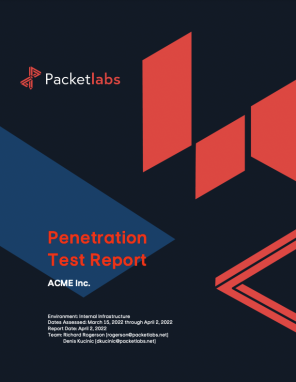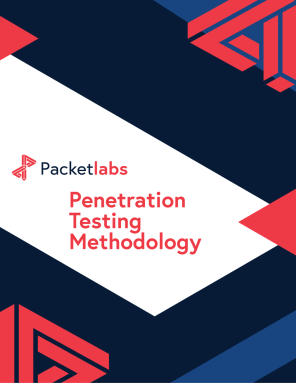Infrastructure Penetration Testing
Cyber-fatigued teams can’t fix what they can’t see. Packetlabs’ Infrastructure Penetration Testing blends 95% manual testing with targeted automation to uncover vulnerabilities in your networks, Active Directory, and third-party software, the places scanners and surface-level audits miss. Findings are delivered as a step-by-step attack narrative, showing clearly and specifically how real-world exploits could compromise your environment.
Your three-step path to infrastructure resilience:
Scope for Alignment: Before testing, we ensure scoping is fully aligned with your objectives and environment. On-premise and hybrid assets, including Active Directory, are mapped to highlight critical systems and exposure points attackers would exploit.
Identify and Exploit: We all uncover vulnerabilities, misconfigurations, and privilege escalation paths using 95% manual testing. Unlike firms that stall at endpoint detection, our experts engineer custom EDR bypass techniques to simulate real adversaries and reveal how far an attack could truly go.
Fix and Verify: Receive a prioritized remediation roadmap. After fixes are applied, a complimentary retest validates remediation and ensures they can’t be bypassed.
Turn insights into action; expose gaps before they’re exploited.
Contact Us
Your three-step path to infrastructure resilience:
Scope for Alignment: Before testing, we ensure scoping is fully aligned with your objectives and environment. On-premise and hybrid assets, including Active Directory, are mapped to highlight critical systems and exposure points attackers would exploit.
Identify and Exploit: We all uncover vulnerabilities, misconfigurations, and privilege escalation paths using 95% manual testing. Unlike firms that stall at endpoint detection, our experts engineer custom EDR bypass techniques to simulate real adversaries and reveal how far an attack could truly go.
Fix and Verify: Receive a prioritized remediation roadmap. After fixes are applied, a complimentary retest validates remediation and ensures they can’t be bypassed.
Turn insights into action; expose gaps before they’re exploited.
Service Highlights
Zero False-Positives. Proven Impactful Findings.
It's critical to manually validate every finding, eliminating scanner noise and unverified assumptions. At Packetlabs, we ensure every vulnerability is confirmed as truly exploitable and proven impactful, with context tied to adversary tactics and business risks. The result: findings that matter, not noise. Why it matters: False positives waste valuable time, but so do irrelevant “findings” that don’t translate to real-world risk. By focusing only on vulnerabilities that are both exploitable and business-impacting, we give your team the confidence to act quickly on what truly strengthens resilience, not chase distractions.

Our Uncompromising Standards.
Beyond Automated Testing
While automated scanners can uncover simple surface-level findings, Packetlabs’ expert-led manual-first penetration tests probe the logic, business workflows, and chained exploits that scanners routinely overlook. Leveraging manual exploitation techniques, threat-intel-driven scenarios, and creative lateral thinking, our team exposes high-impact vulnerabilities competitors miss and translates them into clear, fix-ready guidance.

Custom-tailored Engagements
Every organization faces a distinct attack surface, so Packetlabs begins every engagement by hand-crafting a threat model and test plan that map precisely to your business, technologies, and risk priorities... with no off-the-shelf checklists, ever. Because our process is 100% tester-driven, seasoned experts (not automated tools) decide where to probe deeper, pivot laterally, and chain exploits that off-the-rack methodologies would never attempt.

Continuous Improvement
Threat actors innovate every day, so our playbook and testing methodologies can’t stand still. After each engagement, our testers feed the latest exploit paths, red-team lessons, and threat intelligence insights back into our proprietary checklists and methodologies, evolving them in real-time. When we arrive at your environment, you’re protected by a continuously improved framework that already accounts for the newest tactics most competitors won’t confront until next year.

Fix. Verify. Prove Resilience
We provide your team with prioritized vulnerability remediation guidance that is aligned with security best practices and your organization's operational needs. When remediation is complete, we perform a complementary retest, confirming that all vulnerabilities have been effectively patched, security controls are solid, and your defenses are working as intended.
Why Conduct Infrastructure Penetration Testing?
Board-Level Assurance
Your executive team is under constant pressure to prove that security investments are working. Infrastructure penetration testing turns that anxiety into clarity: our experts map your environment, exploit real attack paths, and package the results in a board-ready report that speaks revenue risk, not router configs. When directors see a simple three-step plan (Recon & Mapping → Network Attacks → Post-Exploitation validation) they know exactly how the company will stay out of tomorrow’s breach headlines and why approving next quarter’s security budget is non-negotiable.
Avoid a Costly Breach
The average remediation and downtime price-tag for a North-American breach now tops seven figures, but those numbers drop to near-zero when exploitable holes are found before criminals arrive. By treating every engagement like a live adversary and pivoting across Active Directory, cloud hybrids, and legacy subnets, we surface the one forgotten credential store or misconfigured firewall rule that could otherwise bankroll an attacker. The cost of a proactive pentest is a rounding error compared to the financial, legal, and reputational fallout of a breach.
Find Vulnerabilities Others Overlook
Automated scanners stop at open ports; Packetlabs testers keep digging. Our 100 % tester-driven methodology layers manual discovery, privilege escalation, and chained exploits that check-box assessments miss, revealing business-logic flaws and abuse paths hidden deep inside production networks. Whether it’s an obscure cross-forest trust in Active Directory or an overlooked service account in a hybrid cloud, we expose weaknesses most competitors never even look for, giving you an edge attackers can’t predict. We lose sleep over exploits so you don't have to.
Demonstrate Real-World Impact
Stories move people more than spreadsheets. That’s why every Packetlabs report includes vivid evidence (including screenshots, command traces, and “step-by-step replay” narratives) showing how we breached a segment and what could have happened next. Stakeholders don’t just hear about risk; they see it, feel it, and get a clear remediation roadmap. The result is a unified call to action across IT, compliance, and the boardroom: fix the findings, strengthen the stack, and move forward with confidence.
Resources

Penetration Testing Sample Report
Take a look at our sample infrastructure penetration testing report to get a better understanding of what information will be delivered in the final report.
Download Sample Report
Penetration Testing Methodology
Our Penetration Security Testing methodology is derived from the SANS Pentest Methodology, the MITRE ATT&CK framework, and the NIST SP800-115 to uncover security gaps.
Download Methodology









